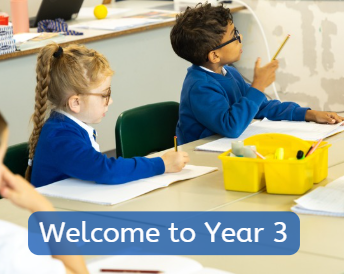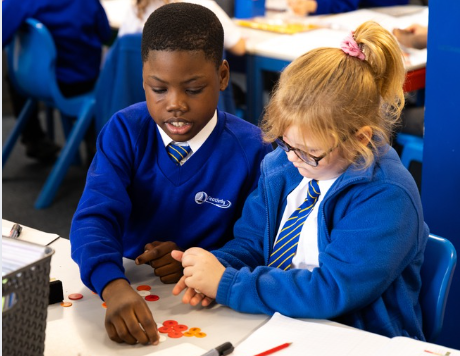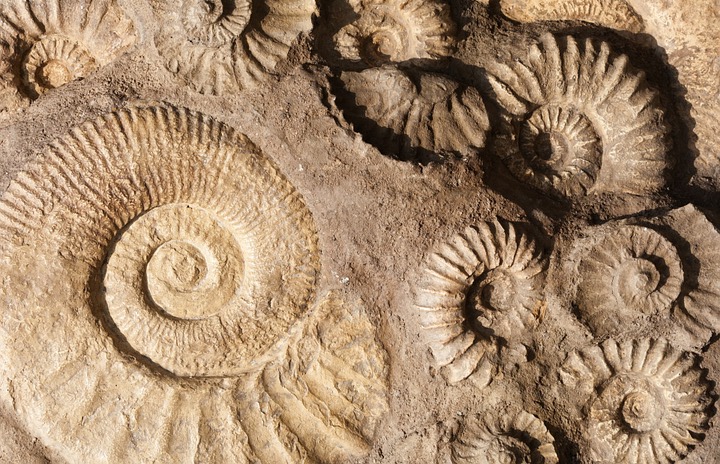Year 3

Year Three Team
Year 3 is made up of three classes: Skylark class (Mrs Croucher), Jay class (Mr Colbran) and Dove class (Miss Parrales). Other adults in Year 3 include Mrs Dacombe and Ms Burns.
Year 3 is a very exciting year, not just because we have moved from the Infant building to the Junior building, but because of all the exciting themes we learn about. Our learning is thematic meaning each term we focus on one theme through our reading, writing and wider curriculum. By learning in this way, we deepen our understanding, become critical thinkers and develop both knowledge and skills in key areas.
Our themes in Year 3 are:
- Fossils Rock
- Where in the U.K.?
- Romans’ Rule
- Romans’ Rule (second term)
- Around the World in Six Weeks
- Out Of This World
All our themes give us the opportunity to acquire new knowledge, develop our skillsets, apply our Featherby Values and develop our 6Cs: Character, Communication, Collaboration, Creativity, Critical Thinking and Citizenship. Our learning in school is built around these areas and linked in with a class read. We love sharing what we have learnt in school but learning also happens outside the classroom and our homework and wider reading opportunities are one way this happens. It is important to us that we are always learners whether we are in school, at home or out and about in the world. Events we look forward to are our Big Outcomes where we welcome parents and visitors into school to share in our learning with us; this is one of the times you will see our 6Cs in action! This year our Big Outcome focused on our first theme of Fossils Rock.

Fossils Rock
Our first theme in Year 3 is Fossils Rock which is a fantastic starting point for us as it builds on learning from our previous years and gives us the opportunity to read, ‘The Iron Man’, a fantastic text by Ted Hughes. This theme allows us to develop our knowledge around the types of rocks and how fossils form, the Stone Age into Bronze Age into Iron Age periods and settlements like Skara Brae. Learning in this way supports us in making connections with our learning to create knowledge webs. Our learning is practical too with us making Stone Age Shelters and cave paintings. To let you in on a little secret, we return to key learning throughout our time in Featherby, we look at fossils in Year 6 alongside Charles Darwin. Looking at fossilisation over time helped biologists to understand evolution - how human beings have adapted over thousands of years.

Where In The UK?
Our second theme is Where In The UK? where we have the opportunity to produce a range of writing outcomes, playscripts, adventure stories and poetry inspired by our theme and class read, ‘Alice in Wonderland’. We add to our existing webs of knowledge, recalling our learning from Year 1 which was about the capital cities in the UK. In Year 3, we learn about the location of different countries and capital cities in Europe and their location in relation to the UK. In science and art, we learn about animals indigenous (native) to the UK producing sketches of these creatures, developing our key skills in these areas.

Romans’ Rule
Our learning on the Romans extends across two terms and we revisit some of our learning in Year Four when we learn about the Anglo Saxons creating webs of knowledge about invaders through spaced learning. This term, our learning centres around the Roman invasion and occupation of Britain where we recall our geographical knowledge from, ‘Where In The U.K.?’ and recall our historic knowledge from term one on the Stone and Iron age. We develop our understanding of the Roman timeline and how Romans impacted on the culture, technology and beliefs of Britons. We develop our key skills in art by producing mosaics and making printing blocks a skill we revisit in Year 4. Our class read this term is a non-fiction text called ‘Romans’ which we explore through producing newspaper reports, mystery writing and instructions as well as interleaving with other aspects of the theme.
Romans’ Rule (part 2)
Our second term on Romans’ Rule allows us to deepen our learning in this historic time and recall the learning from Term 3. Our writing outcomes from the knowledge we learn this term are myths, letters and information text. We develop our critical thinking by questioning different sources and viewpoints of Roman rule in Britain, including British resistance through the use of artefacts and recounts. We are creative through producing stained glass windows to portray stories and interweave with Christian stories and our RE learning. Learning about magnetism and attracting and repelling materials develops our scientific knowledge.

Around the World In Six Weeks
It is our opportunity to return to geography as our key driver as this theme explores countries and cities around the world. We make comparisons and contrasts to these locations through learning about the cultures, environments and beliefs. Our science and design key skills interweave through learning about light and dark allowing us to make and create shadow puppet shows. Our creative art skills and knowledge develops through the theme by producing sketches and landscape pictures from around the world. Our learning and knowledge develops outside the globe into space as we learn about the sun, knowledge we return to and recall in Year 5. Our class read underpins the theme ‘Around The World In 80 Days’.

Out Of This World
Don’t be fooled, our last theme of the year is not about space but about plants and their importance on our planet. We return to our Year 2 webs of knowledge about plants becoming experts in the conditions they need to survive, the function of different parts of plants and their impact on ecosystems. We deepen our learning by interweaving with art to produce O’Keeffe inspired artwork through experimenting with different textures and colours for effect. We develop our citizenship and skills around understanding humans' impact on different environments. Our final class read of the year is ‘Inside Plants’ - another non-fiction text which will inspire our shape poems, explanations and instructions.

We know that this learning will continue at home too. To support learning in school, please test our knowledge by asking us questions. You can also read these books with us on our theme to extend and deepen our knowledge.

Close